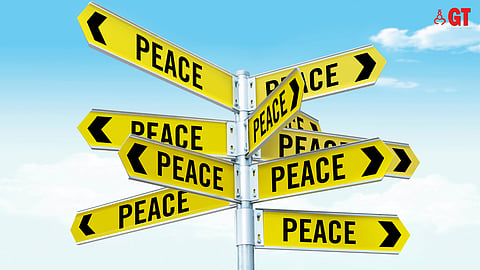

Over the last few weeks, some events that unfolded in Goa do not bode well for the state well-known for its communal harmony. If we very narrowly dissect the incidents, it appears we are in for some turbulent times as the signs of religious intolerance are palpable.
If there is any challenge we face today, it is the one that implores us to live in harmony with each other and say no to the politics of hate.
The times necessitate revisiting our respective faiths and delving deeply to see if they teach us to hate.
According to John Barton, professor of religion and philosophy and director for the Centre of Faith and Learning, we need to grant each other the dignity of difference; we also need to find those things that build bridges between our differences – and kindness does just that.
However, of late, our differences have been bringing us to the streets with demands that go beyond the scope of the law. We have lost the capacity to forgive – a quality most integral to living life in peace and harmony. Sometimes, it compels me to conclude that we are better off as human beings, not religious beings.
It is a well-established fact that where there is peace, there is progress. Worldwide surveys have shown that societies have made tremendous progress when peace is maintained.
It goes to show that peace and development go hand in hand. On the flip side, places torn apart by religious conflict or wars have shown reduced economic growth.
At this crucial juncture, when Goa is faced with a multitude of problems, ranging from unemployment to the rising cost of living, it cannot afford to have a society that lives in conflict – more so religious or communal. It is time for us to understand that peace is the only way forward.
It is time for leaders of all religions to come together and start a meaningful dialogue for peace. We, as people, should realise that dialogue can be strong deterrence to intolerance and will help us develop a peaceful disposition towards other faiths.
Many may disagree with me that some of those who have settled in Goa over the last few years are trying to influence Goans and foster hatred between communities. The police are duty-bound to track such hate-propagating elements and ensure that they don't bring their Machiavellian plans to fruition.
India has always been a tolerant country, but that picture has been distorted over the last several years.
In the case of Goa, the state has always been that shining example of all communities existing in accord with each other. Goans have to wisen up and keep away from malignant elements and report them to the authorities.
There is no denying that religious intolerance and communal politics are on the rise in India, and the idea of nationalism is distorted. Religious chauvinism should not have any room in a place like Goa.
The Goa government will do well to initiate the concept of peace committees to sensitise people about maintaining harmony in society. It is also time to revive those peace committees which are already in existence, but dormant.
Also, just having peace committees will not be enough. There has to be a consistent dialogue between the community leaders who will have to take pains to understand and respect diverse religious beliefs, boundaries and freedoms.
There is no denying that religious intolerance and communal politics are on the rise in India, and the idea of nationalism is distorted. Religious chauvinism should not have any room in a place like Goa.
The demon of communal politics is at our doorsteps, knocking on our doors. Do not let him in. Let peace be with all of us.